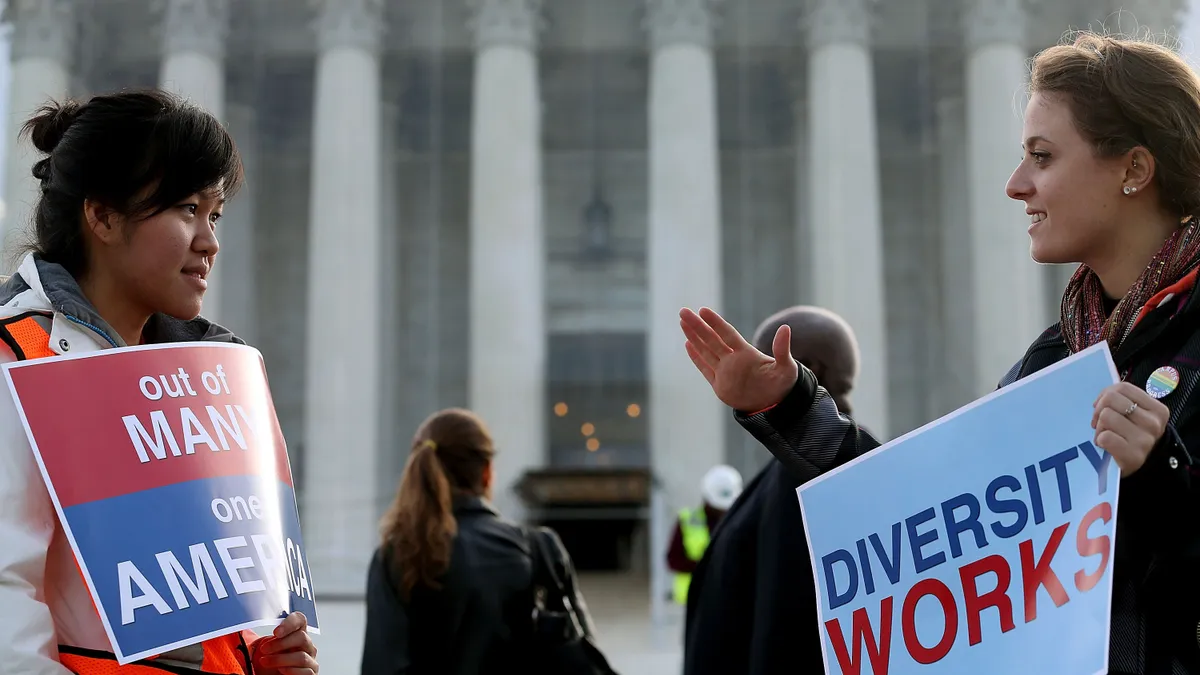The U.S. Supreme Court’s blockbuster decision in June knocking down race-based university admission practices has no immediate impact on corporate diversity, equity and inclusion (DEI) programs but expect high-profile challenges in the months ahead, says Samir Deger-Sen of Latham & Watkins.
“Don’t hit the panic button,” Deger-Sen said in a webcast hosted by the law firm. “They are just as legal today as they were beforehand; DEI programs are not fundamentally affected by the decision. But there’s a new climate and we can expect there are going to be challenges.”
Companies got a taste of what’s to come when a group of 13 state attorneys general sent a letter July 13 to the CEOs of Fortune 100 companies saying they are preparing to scrutinize their DEI practices as potentially discriminatory by making diversity a factor in their hiring practices.
“In an inversion of the odious discriminatory practices of the distant past, today’s major companies adopt explicitly race-based initiatives which are similarly illegal,” the letter says. “These discriminatory practices include, among other things, explicit racial quotas and preferences in hiring, recruiting, retention, promotion, and advancement. They also include race-based contracting practices.”
The letter generated pushback from a group of 21 other state AGs who, in their own letter to the Fortune 100 CEOs, called the other AGs’ outreach a form of intimidation that has no basis in law.
“Properly read, [the Supreme Court decision] provides no basis to conclude that a company’s efforts to reach and recruit from a broad and diverse applicant pool is now prohibited,” the letter says. “Private companies remain free to expand access to employment and contracting opportunities, subject to the same limitations under Title VII and Section 1981 that have applied to them for over half a century. ”
Title VII and Section 1981 refer to provisions in the 1964 Civil Rights Act under which programs for addressing inequality were authorized in hiring and contracting, respectively.
Takeaways
For general counsel trying to understand what this newly politicized environment means for their company, the key is keeping their DEI programs free of concrete, numerical goals or quotas, Deger-Sen says.
“A program that tries to establish a fixed goal — a quota — for minority hiring or minority contracting is going to be much more vulnerable than a plan that doesn’t use numerical targets,” he said. “These are just factors to start considering.”
Even if your program doesn’t contain a numerical target, it could still face a challenge, he said.
“The court made clear that even if you have a program that is not technically using race as a plus factor, in some explicit way, if it tries to do so in a way that is, in an implicit way, really focused on race and not in fact focusing on the individual contribution of the person, that could be subject to challenge,” he said.
Based on some of the points made in the decision, if your company is involved in matters where race is built into the product or service that’s provided, like a nursing or other program that specializes in conditions that disproportionately affect a minority, that would seem capable of passing a challenge because it’s not dependent on the diversity rationale.
“Those sorts of interests could be tested in litigation in the future but it would have to be an interest that’s concretely measurable and it couldn’t be the general interest in diversity that had undergirded the court’s previous cases,” he said.
The main takeaway is that corporate DEI programs are not subject to the court decision and remain legal but will get tested in the months ahead. To put your company in the best position to withstand any challenge, keep your hiring and contracting policies free of numerical goals.
“Think through how those programs are structured,” he said.











